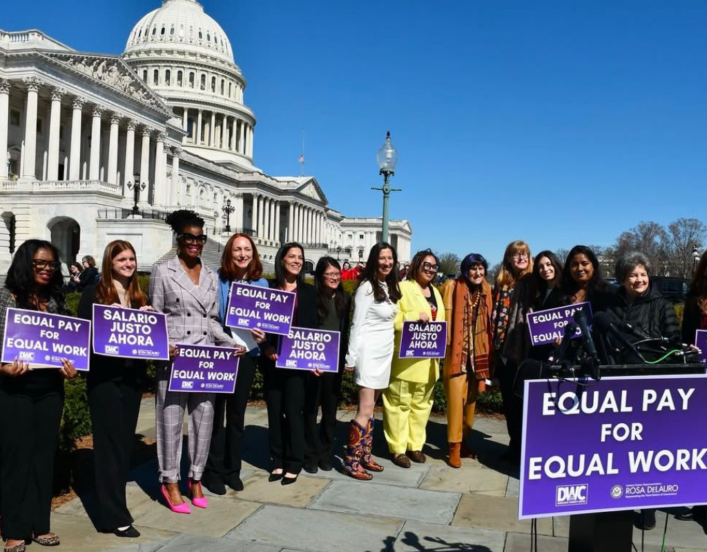Policy Recommendations: Paid Leave
AAUW works toward greater availability of and access to a high standard of benefits and policies that promote work-life balance, including paid family and medical leave and paid sick days.
Unlike the majority of developed countries worldwide, the United States does not guarantee paid annual leave, paid time off for illness or family care, or paid parental leave. Without these policies, balancing the responsibilities of work and family can be difficult for employees, impeding productivity, making recovery from major illnesses or injuries difficult, and in some cases inhibiting the healthy development of children.
AAUW has long supported workplace policies to address the health and caregiving needs of employees. While the Family and Medical Leave Act (FMLA) of 1993, which provides job-protected, unpaid leave, was an important first step, its promise remains out of reach for many. The U.S. workforce continues to change, making it necessary to update the law with policies such as paid family and medical leave and paid sick days.
Paid Family and Medical Leave
At some point, most workers will need time away from work to deal with a serious personal or family illness, or to care for a new child. FMLA makes it possible to take family leave and keep your job for some workers, but not all. Unfortunately, FMLA fails to cover about 40% of workers. This includes those at companies with fewer than 50 employees, employees who have been with their employer for less than a year, or workers who have not met the required number of annual hours. Expanding FMLA coverage to more workers would be beneficial; however, it is still insufficient to ensure a family’s economic security.
Even when covered, many workers cannot afford to take unpaid leave without endangering their economic security. As a result, many people do not take time off for serious personal or family illnesses or when they need to care for a new child.
A federal paid leave program will build stronger families and healthier workers. Paid leave contributes to improved newborn and child health by allowing both parents the time they need to help with health care decisions and responsibilities.
For example, time at home with newborns and young children has been shown to, among other benefits, increase parents’ ability to attend medical visits and decrease infant and post-neonatal mortality rates. It also allows ill or injured adults time to recover and gives family members time to care for sick relatives. And it enables people to help their loved ones, including older family members with health problems, to recover from illness and avoid complications, thereby reducing hospital readmissions and health costs.
For businesses, paid leave helps them by retaining workers and reducing the high costs of turnover, such as advertising, interviewing and training new hires. A comprehensive review found that the cost of turnover can range from 16% to 200% of an employee’s annual compensation, making such unnecessary turnover very costly for employers. As just one example, in California, a state that has a successful family leave insurance program, workers in low-wage, high-turnover industries are much more likely to return to their jobs after using the state’s program.
Without access to paid leave, workers, especially women, face the continuing economic disadvantage of lost wages and are forced to prematurely return to work. AAUW supports passage of the FAMILY Act, which would establish paid family and medical leave for most of the U.S. workforce. The FAMILY Act is an affordable, cost-effective, and sustainably funded solution that does not cut or reduce other essential benefits. We also support provisions to expand FMLA and ones that provide paid leave for public-sector employees. Finally, AAUW urges states to follow the path of California, New Jersey, Rhode Island, Washington, New York, Massachusetts, and Washington D.C., and pass paid family and medical leave laws.
Paid Sick Days
In addition to lacking federally guaranteed paid family and medical leave, more than 34 million private-sector workers — nearly one-third of the workforce — cannot earn paid sick days. This means that when they fall ill with the flu or have a sick child who needs to stay home, workers have to make tough decisions — jeopardize their employment or go to work sick. Low-paid workers are especially hard hit. These workers often must go to work sick and contagious. For those who work in public-facing industries, such as food service, that endangers public health.
Today, only 60% of working women have some access to paid sick days and nearly 40% of mothers say they are solely responsible for staying home from work with sick children, compared with only 3% of fathers.
Women disproportionately bear the economic cost of taking children or elderly family members to the doctor. Yet many women delay seeking health care for themselves because they cannot take time off work, affecting their capacities as employees and primary caregivers.
If hardworking Americans have access to a minimum number of earned sick days that can also be used to care for sick family members, working parents and caregivers will no longer have to make the difficult choice between caring for loved ones, or themselves, and losing much-needed income. For a family without paid sick days, three days of pay lost to illness can be the equivalent of their monthly health care or food budget.
Paid sick days are also good for workforce stability and business productivity. Employee turnover is costly to employers. Further, when workers do come into work sick, they are significantly less productive. The loss in productivity due to working while sick costs our economy $218 billion a year. Paid sick days help reduce these unnecessary costs for employers.
AAUW supports federal legislation such as the Healthy Families Act, which would ensure workers in businesses with 15 or more employees can earn up to seven job-protected paid sick days each year to be used to recover from their own illness, access preventive care, or provide care for a sick family member. We also encourage states and cities to follow the example of the 10 states, 19 cities and three counties that have paid sick time laws on the books.
Take Action
Members of AAUW’s Action Network receive urgent e-mail notices and text messages when their advocacy is needed most. With our online Two-Minute Activist tool, it takes just minutes and an internet connection to make your voice heard on issues impacting women and girls!
Sign up to get timely action alerts
If you prefer, text “AAUW” to 21333 to get AAUW messages via text


